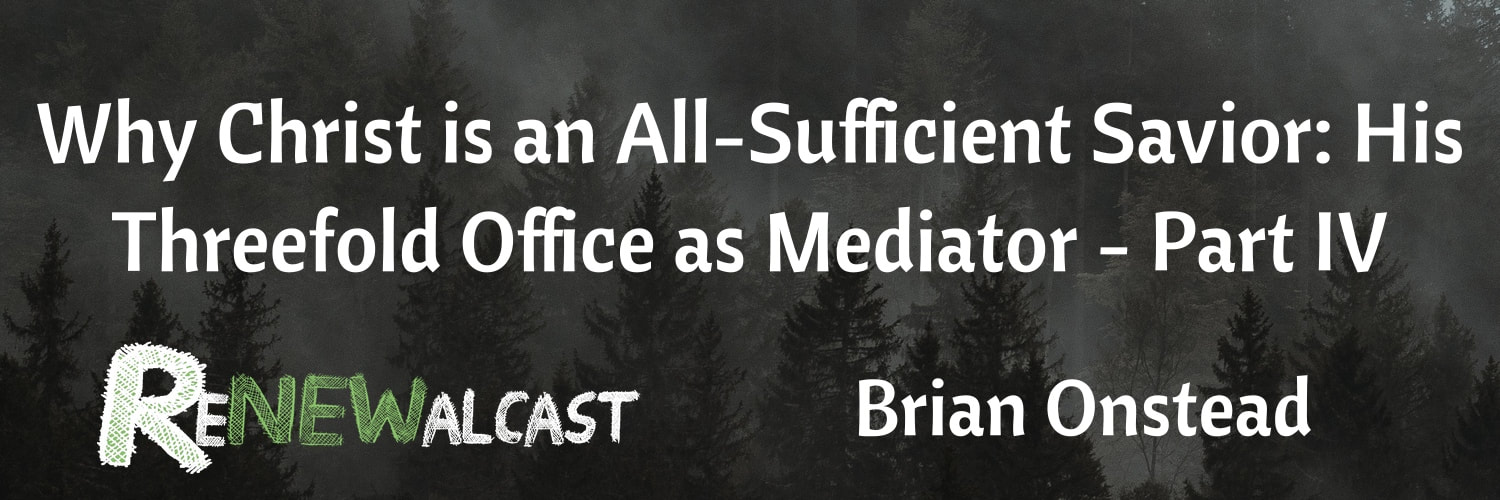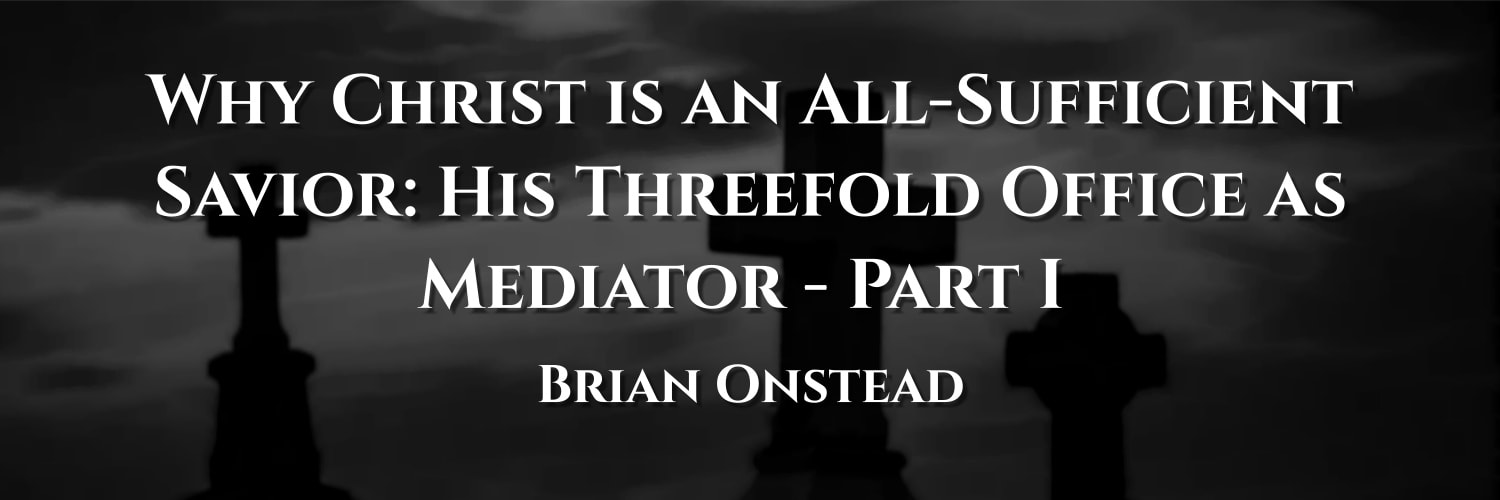|
In my last post I discussed the relationship of the Law of God to the believer. While the
Law is the standard for how believers are to live, it is no longer in the form of a covenant of works where they must do it in order to obtain, secure, or keep eternal life. The Lord Jesus came as the Last Adam and was born under the Law in order to fulfill its righteous requirements. As we saw last time, the Law as a covenant of works has both a promise of blessing and a threat of a curse based on one’s performance to it. If at any point the person under the Law fails to perfectly and perpetually keep it, then he is cursed with eternal death (Gal. 3:10). However, if one personally, perfectly, and perpetually keeps the Law, then that person is rewarded with eternal life. In Luke 10, when the lawyer asked Jesus what he needs to do to inherit eternal life, Jesus said that he needed to do the Law (keep it perfectly at all times and in all ways) in order to live (gain eternal life). This covenant of works is encapsulated in the phrase “do this and live” (Luke 10:28; cf. Lev. 18:5). Thankfully, our glorious Lord Jesus was born under this Law as a covenant of works and fulfilled it by personally, perfectly, and perpetually obeying it as an Adam - that is, as a representative for his people. Because of his perfect obedience to the Law, he earned eternal life for himself and those whom he represented. Believers simply trust in Jesus’ perfect obedience to the Law and his earning the reward of eternal life and receive it as a free gift. I believe much of the confusion over the law stems from not understanding how it is a
covenant of works. The late Meredith Kline once said that those who reject or do not understand the covenant of works are the ones who end up putting others under it. This is because if we do not recognize the covenant of works in Scripture - such as in Genesis 1-2 and Romans 2:6-13 - then we will interpret those sections as normative for believers. For example, a Roman Catholic I was recently interacting with quoted Romans 2:6-13 as proof that believers will be judged by their works. Because he did not understand that Paul was talking about the covenant of works in that section, which believers are no longer under since Christ has fulfilled it, he interpreted it as incentive for obedience so that we can hopefully have enough works to pass final judgment. Not only does a rejection of the covenant of works result in the legalism of putting believers back under a covenant of works, it also leads to a form antinomianism. If the covenant of works is rejected, then Paul’s statement “you are not under the law” (Rom. 6:14) cannot be interpreted as no longer being under the law as a covenant of works, but rather only as to the content of the law. In this post, I want to simply begin by very briefly introducing the covenant of works before addressing in subsequent posts how it is necessary for having a theology where the Law and the Gospel are clearly distinguished. There has been much confusion over the relationship of the Law of God (the Ten
Commandments) to the believer throughout church history and especially in our day. There are antinomians who, in one way or another, deny the Law of God, whether it is by crossing out the 4 th Commandment, or by saying that the Law was only for the Jews and has no place in the Christian’s life, or by declaring that God broke his Law in order to love (as one famous heretic recently said). On the other side, there are legalists who put believers back under the Law as a covenant of works. They use the threat of judgment in order to effect change. They suspend believers’ justification and keep the threat of condemnation possible until believers strive to produce an undetermined amount of holiness (which they are always left guessing and which only the pastor or preacher can determine) in order to keep people incentivized to pursue holiness. In all of this, there is great confusion over the relationship of the Law to the believer. In my last post I covered the topic of legalism. I used a definition of legalism from
Geerhardus Vos that is not common, but is what, I believe, gets to the heart of legalism. Essentially it’s this: knowing God’s law apart from knowing his love. God has a list of rules that we must follow, but he does this only to restrict us and not because he cares for us. His commands are divorced from his care. It stems from the dark face that Satan craftily placed on God when he asked Eve, “Did God say you shall not eat from every tree.” While it is technically true that they were not allowed to eat from every tree, this is not how God framed it. God said in Genesis 2:16, “you may surely eat of every tree of the garden” and then goes on to tell them of the one tree from which they were not allowed to eat. Whereas God said “you may surely eat of every tree” Satan said “you may not eat of every tree.” Thus, Satan shaped the narrative to make God look restrictive, withholding, and thus unloving and uncaring. This dark face made Eve look at God as a “hard man” (Matt. 25:24). If someone were to ask you to define legalism, how would you define it? Perhaps you
would define it as adding to God’s law or making people do things that God has not commanded. The way I would put it is, “Saying thus says the Lord where he has not spoken.” It wasn’t too long ago, however, that I came across an interesting definition of legalism - one that I had never considered. In his book The Whole Christ (which I believe every pastor would greatly benefit from) Sinclair Ferguson utilizes a definition of legalism from the nineteenth century Dutch reformer Geerhardus Vos: “Legalism is a peculiar kind of submission to God’s law, something that no longer feels the personal divine touch in the rule it submits to.” 1 This is a cumbersome way of defining it, but what it refers to is separating God’s law from God’s person. The law is no longer seen as coming from a loving Heavenly Father who has our best interests at heart, but a mere set of rules for us to do “just because.” The way I like to sum up this definition is this way: It’s knowing God’s law apart from knowing his love. In my last post I argued that Christ’s kingly office is perhaps his most misunderstood office among reforming Calvinists. In my experience, Calvinistic Baptists distinguish Christ’s priestly office as exercised solely for us, from his kingly office which is all about our response. Their message is summarized like this: because Christ is king, he needs to be obeyed - and if you are not obeying him, then you are not saved! This seems to be a reaction to the Arminian and antinomian circles out of which many Baptists come, where it is posited that all that matters is that you have made a decision for Christ and how one lives is optional. Disturbed by this kind of teaching, Calvinistic Baptists are zealous to point out that because Christ is king he must be obeyed or you’re not his!
In my latest series of posts I have been talking about why our Lord Jesus Christ is an all-
sufficient Savior. In doing so, I wanted to explore his three-fold office as Mediator. What it means for Christ to be a mediator is for him to be in the middle between us and God in order to bring us to God. In executing his saving work as our Mediator and Redeemer, he fulfills a three- fold office of prophet, priest, and king. I have been working through the Second London Baptist Confession of Faith (1689), Chapter 8, paragraph 10, which nicely summarizes these three offices of Christ. In my last two posts I covered Christ’s prophetical and priestly office. In this post I cover Christ’s kingly office. In my latest series of posts I have been talking about why our Lord Jesus Christ is an all-sufficient Savior. In doing so, I wanted to explore his three-fold office as Mediator. What it means for Christ to be a mediator is for him to be in the middle between us and God in order to bring us to God. In executing his saving work as our Mediator and Redeemer, he fulfills a three-fold office of prophet, priest, and king. The Second London Baptist Confession of Faith (1689), Chapter 8, paragraph 10 nicely summarizes what these three offices of Christ:
One of my favorite sections of the Second London Baptist Confession of Faith (1689) is the section on Christ’s threefold offices. This is found in chapter 8 which speaks of Christ as the Mediator. What it means for Christ to be mediator is for him to be in the middle between us and God in order to bring us to God. Paragraph 10 of that chapter describes how Christ functions in his three-fold office as mediator:
We’ve been hearing the word “narrative” come up quite a bit as of late. We hear quite frequently, “It didn’t fit the narrative,” “The media has a narrative.” It is true that narratives are a driving force in the way we see things. A narrative is simply a story by which we present information. Stories are powerful, intriguing, and often draws people’s interest. We remember stories more readily than anything else (except perhaps songs).
|
Authors and Categories
All
|
About Renewal CastWe believe that our minds are to be shaped and renewed by the life-giving and transforming Word of God through the power of the Holy Spirit - so we pray that as you listen you will see Jesus more clearly.
|
Useful Links |
Stay Connected!We are always working on something new and exciting, so make sure to be the first to know!
|
© Copyright 2023. All Rights Reserved.









